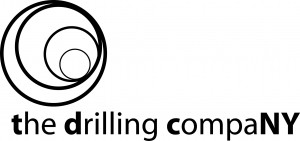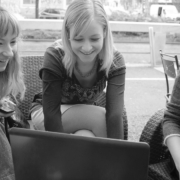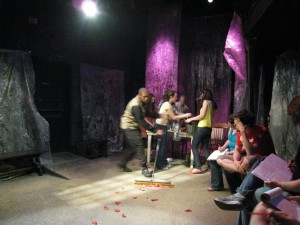(FYI:Hamilton answered questions from members, for ten days after this post went live. I will be doing this with future interviewees so, if you would like to join in the fun, post your details in the box to the right.)
Hamilton Clancy, artistic director of The Drilling Company, tells it like it is, in the off-off world.
Can you tell me when you created the company?
We began the company in 1999. That was our first production, and it was always in my mind, even at the very first production, we were always moving towards the idea of a company, something that would be organized and incorporated.
What was the mission you started with, and has it stayed the same?
The mission we started out with, is really great for me to talk about because that’s really my favorite mission. The mission that we started with was The Drilling Company is like jazz, we integrate a variety of voices along a common melody line, and produce something that is new and has never been heard before. That mission in our early years, I was told, was too artsy for grant people, so we have since developed a mission that says something more to the point that the Drilling Company supports in every way and fashion imaginable, new writers and their endeavours to create new work.
So, if that is your official mission, is your heartfelt mission different?
My heartfelt mission is the same. My heartfelt mission, which is still part of our mission, is to create theatre experiences that integrate people from all different walks off life and different communities. At the time, what I saw was not only racial division in the communities that were gathered to see theatre, but socio-economic division, geographical division, all sorts of things that made each production very targeted to a very particular audience. I thought that that was a response at the time, it still is, to our market dynamic, which basically says, identify the niche who’s interested in your work and then target them with the work, and create work that is targeted for a niche. And the dilemma I saw was that we weren’t seeing enough work and enough motion that was really integrating communities; that people were even having a loss of the idea of community. They were with a bunch of people who were the same as they were, and not experiencing enough of people who were different.
Would you say you were consciously moving away from that niche mentality?
Oh, absolutely consciously moving away from them, and failing all the time. I would be silly to sit here and claim that we didn’t have a very particular kind of person who was interested in new work, and a very particular kind of person in……I’m not interested in defining that person, or limiting our exploration to meeting the needs of that person -I’m more interested in creating an exploration that’s accessible to people from a wide berth of experiences. That’s why we eventually were led to the other program that we added most prominently to our work: Shakespeare in the Parking Lot.
Jazz
When did you add that?
We began co-producing with a company called Ludlow Ten in the summers, around 2002, and we co-produced with them for three years. We have been the sole producer of Shakespeare in the Parking Lot since 2006; we’ve basically inherited this terrific tradition down on the Lower East Side. It really works for us, because the environment of that parking lot brings people together from all different walks of life in a very spontaneous fashion. So, the way in which the Shakespeare is presented and the area in which it is presented, creates a very similar energy to the energy we hope to create around the new work that we do. We felt it was sympathetic with our mission to create this jazz like experience in the theatre. And when I say jazz-like experience, a lot of people they think that I want to make music, of course, obviously because jazz is music, but what we really want to create is a communal experience which integrates a variety of elements that is satisfying to different people within the experience. I can characterize where it became crystal clear, should I tell this story, where this was clear for me?
Sure.
In the very first production we did, it was called “In the Car.” And there was a scene in which two men kissed. One of the actors who was in the scene, their father was going to come and see the play and they were a little sheepish about it, and they said, ‘yeah well, my father would never come and see a play like this, ever,’ but since this actor had written another one of the other plays that was in the evening, this man was going to be in the audience. I thought, ‘wow’ the potential for exposing people to new things if you give them something that they’re interested in and then add the new thing along the way is really terrific, and that really is the only way you can hope to introduce a wider audience to snew ideas or new ways of doing theatre.
So, that happened very early on, and it became really clear to me how these projects that we do around common themes, which has been our raison d’etre since the beginning, has a greater raison d’etre, besides the plays.
To have all different writers write all kinds of plays based on a common theme, really does seem to be like jazz, ‘cause jazz has a theme and all the instruments—
Exactly.
Roots
How did you come up with your name?
There are two stories to that. The one and the quickest is that we wanted something that described what we were hoping, what we thought matched what we were trying to do, which was drill, seek for new work, right, and this idea of drilling that people had for oil, we thought about that oil was this resource people were looking for and they associated great riches with, and we thought drilling for new writing was a great resource that we were seeking; we thought it was a good an apt metaphor. But the real way I came up with the name was that when I was a kid my mother’s family had a company called Booker Drilling Company, that was my mother’s maiden name, my grandfather had started this, my uncle kept it going and it was sold early in my youth. It was actually an oil drilling company.
There was an actress I was in an acting class with . Her last name was Chrysler. I’m not making this up. She was part of the Chrysler family – as in the one’s who built the building.She was extremely enthusiatic and I had helped produce a showcase we were all in and she wanted to do another project. We had a meeting one afternoon and I was sitting in acting class beforehand trying to come up with what we would do next and it just sort of hit me that I would propose starting this theatre company where we asked playwrights to write plays. And I thought we would call it The Drilling Company for the above reason.
The Chrysler’s wound up donating $800 to get our first production off the ground. By New York standards it was a very modest beginning but it was something. I thought it would be creative to take my family legacy and turn it on it’s side – making what sounds very industrial into a conduit for creativity. Some of my family made early donations of anywhere from $50 to $500 to kick us off.
That was in your first year?
Yeah, that was in my first/ second year, so it buoyed some of the production in the first year, but when I started I really had no idea of how expensive it is to create theatre and maintain a company of high standards in New York City. We have always been pulling ourselves up from the bootstraps because we are basically an actor/writer company. Actors are obviously New York centric, because they have to be here to perform, but the writers do not have to be, so we rely on a real grass-roots approach to every project. We have had limited access to the kind of supporters who have deep pockets. But we have had the kind of supporters with deep hearts. And those kind of supporters really keep you going, because they remind you of the reason you started doing this in the first place. And they come to expect a certain joie de vivre to occupy the work and to let you know when it’s not there, so I find that that is the best kind of audience you could have.
I’ve seen people, actors with the driling company go above and beyond the role of being an actor with The Drilling Company. They seem fiercely loyal and they almost have an emotional ownership or part of TDC. What do you think has created that?
Someone said something to me early on, that in your theatre company you will attract people who are like yourself, so tend to yourself. And when somebody said that to me, I thought they were full of baloney, I just thought come on, the people who are attracted to my theatre company, they’re all so different to me. None of them are like me in any way shape or form. I would never accuse them of being like me at all, but nonetheless, I would say that to whatever extent I hope, I try, to bring is some sense of integrity; to try to keep that as much as possible.
You have to make a lot of concessions to keep something going, and most of the people I think of who you speak, I think of them who have more integrity than I do. So I can only say, is that I have actually sidled up to people who have more integrity than I do, so that I look better than I am. And, I’ve had very few experiences where someone has come to the table with that kind of integrity and not had the talent to back it up. I have to say that I filter for that at all levels. Sometimes you work with people who don’t quite get it, you work with those people one time and you don’t work with them again; they don’t normally want to work with you a second time either, so it’s okay.
You were talking about your company that pulls yourself up by your bootstraps, what is your biggest challenge on an ongoing basis?
Fundraising.
How do you go about fundraising?
Cultivate donors who’ve donated in the past, try to discover new interested parties who might be able to help continue the mission.
So, how do you do that?
We have two yearly mailings, a yearly benefit before one of the shows, sometimes two depending on our board of directors, their schedules and desire. You rely on your BoD to make some associations and introductions, new people who might be interested in helping the company to continue the mission. And the cultivation of that economic support and the organization of that is, well, that’s very difficult. It’s very difficult for me, being a professional artist who is still engaged in my own career, the administration of a not-for-profit theatre company, it’s a very dry business. It’s not very exciting, and it involves a lot of paperwork. Someone once said in an early meeting to me, they said look, if you don’t like paperwork, you shouldn’t start a 501c3. That was some of the best advise I have ever heard given, because if you don’t like paperwork, you should not start a 501c3.
What is a 501c3?
That is the US govt’s code for a not-for-profit organization.
How many hours a week would you say you devote to administration?
How many hours are there in a week?
I don’t know. A working day, twelve hours a day—
Um, I would say that’s a misguided question. I would say, with all due respect, that that is a question that my wife would ask me in the best sense, hoping that I would be able to give her an answer that would be able to be the same from week to week to week. And yet, it cannot.
Would you say you have more admin running up to a production opening?
Yup. The difficulty is this: when you have a production opening, like right now, you spend more time on the artistry because there’s a production opening. You’re producing your art.
You’re in your shows?
Yeah, I’m frequently in my shows, or directing my shows, or I take part as an artist. Yeah, absolutely. But I’d say to you, in answer to your question, how much time it takes, the time it takes is relative, the way the industry thinks of it; the world thinks of everything reletive to the size of your budget. So, the presumption is that you do not spend more than twenty hours a week volunteering for any not-for-profit organization.
That’s everything, or just the admin?
Everything. That’s the presumption.
And the reality?
The reality is in art we do what is necessary until it gets done right.
And that could be fifty hours a week, forty hours a week.
Yeah, go see Sunday in the Park with George. Finishing the Hat. That’s the deal. You’ve got to Finish the Hat. It’s not done ‘til you’ve finished the hat. I mean I, that’s the deal. It’s always that and that particular understanding for me, at least, if you take the metaphor of finishing the hat, the artist painting the picture, finishing the hat, that’s a beautiful thing, but if you take the metaphor of the artist writing a grant, which might not be the artist’s forte, might not be something the artist has learned, and yet they apply the same finishing the hat dedication to it’s completion.
And you write letters to them, so that’s another admin thing you have to do?
Yes.
The grant and the grant seeking, that’s a tremendous amount of time and effort, and then probably the biggest thing that takes time in running a theatre company is keeping the books. Don’t let anybody ever fool anybody; keeping the books….
Takes. A lot. Of time.
….I would not be doing right by my interview about the company if I was not clear about one thing. I could not, would not and would never have continued in this endeavour if it were not for my wife. My wife, Karen Kitz, has been an inspiration, and since the birth of our son she’s stepped back in some of her engagement, but having somebody who actually is really there with you to answer some of the tough questions in some of the tough times makes all the difference in the world. I’ve been very fortunate, very lucky. She is a remarkable person.
So that leads me onto the next question. How many people are on your board, what is the board?
We have a five person board of directors now. It’s about right for an organization of our size.
And when was that established?
In 2000 when we were incorporated.
Can you talk about that? You got your not for profit status from the grant?
No. How it worked is, I registered my identity as ‘doing business as’ here in New York first, then I incorporated and then I filed for my not-for-profit, all in the first year. By the end of 2000 I think I had gotten all that. I think I got my not for profit number in the Spring of 2000..
And you were called The Drilling Company and that was all fine?
Yeah. The only reason I opened a DBA was because—It’s called a DBA account. You open a DBA account at a bank, so I was basically Hamilton Clancy doing business as The Drilling Company. It was really an account in my name with The Drilling Company on it, and over time, as we got incorporated, that morphed into our business account.
And how did you find out how to do that?
I walked into the bank and started asking questions.
I’m starting a theatre company, what do I do?
Yeah, I figured I had some money, I wanted to have a company that said The Drilling Company on it. I just figured all the way along that I wanted to have stuff that had our name on it.
And how often do you meet with the board?
Well that’s always evolving because board members change and sometimes the board shifts to accommodate new board members . We are in the process right now of developing a meeting schedule for the board. I would say a couple of times a year. It varies from year to year. Sometimes it’s three or four times a year, sometimes it’s twice a year. Just depends upon the way, sometimes corporate schedules and artistic schedules are not the same.
Now you’ve been doing this for over ten years, so, looking back at Hamilton Clancy in 1999, what would you tell him to do differently? What do you know now, if only I had know that I would have done that?
(Long pause)
Well…
That’s a hard question. I’ll tell you why that’s hard for me. I insist normally that one always has to look at one’s past as being the preface as being the success of one’s future.
Okay. Young student coming out of drama school now, setting up a theatre company, what would you say to them from your experience? Admin? Get a temp job?
I would say to them spend time in the woods with yourself before you begin, so that you know as well in yourself as possible why you are about this endeavour.
I would say to spend time collecting around you material, essays about the theatre that inspire you and remind you that theatre is an important place to be, an important thing to do, because you will need them. These will be your antidepressants. As you go along the road, you will need to be reminded by the great voices and the great minds that have gone through time, when they have sat down and written about the theatre, why you are going about this task.
I would say that to whatever extent that you can divest yourself of full responsibility the earlier the better, that the more you share responsibility within the organization, the more healthy the organization both will look to others, and will in fact be.
I would say create a box, perhaps it would need to be the size of a laundry basket, but start out with just a box, for all letters, memos and details of discouragement. They should be put aside in a box and kept there, the ‘no you don’t get a grant’ etc, etc. They should be kept in a box and kept there, so they can be duly looked up if someone wants to see why you have been discouraged. But so that you do not have to run across them in your daily activity, but can move on with wisdom and grace as you go forward in the battle.
And where do you see The Drilling Company in ten years’ time?
I think that some of our playwrights will be produced on a regular basis and I think our Shakespeare in the Parking Lot program will have grown to touring and possible other locations. So, I envision in ten years that we will have a community that is not only thriving with artistry, but is also thriving fiscally and economically. And that is the sensitivity that, when you are in the middle of your run, you have to begin to pay more mind to, because we all got to live in the world. And if you want people to be part of your activity, then your activity has to address some of the challenges that we all face as professional artists.
Thank you.
 The Drilling Company produce short plays around a theme and full length productions at their own theatre space: The Drilling Company Theatre for New Plays, and Shakespeare in the Parking Lot in NYCs Lower East Side.
The Drilling Company produce short plays around a theme and full length productions at their own theatre space: The Drilling Company Theatre for New Plays, and Shakespeare in the Parking Lot in NYCs Lower East Side.









